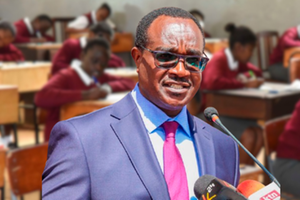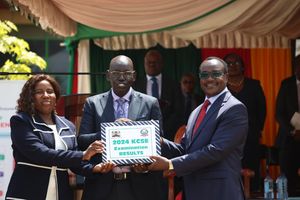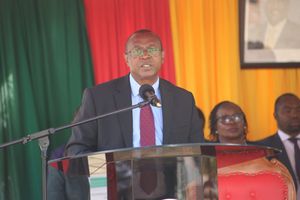Study: Corruption rampant in South Africa's regional authorities

South African President Cyril Ramaphosa appears to testify before the Zondo Commission of Inquiry into State Capture in Johannesburg, South Africa, on August 12, 2021. He conceded on August 11, 2021 there had been rampant state corruption while he was deputy to ex-president Jacob Zuma.
South Africa’s corruption was always known to eat the country from its head. National government officials have recently been accused of being ‘captured’ by corrupt cartels.
But a report this week by a watchdog says local authorities in the country have also been bitten by the bug, signalling a deeper problem in the administrative structures.
The report by Corruption Watch, a non-profit graft watchdog in South Africa, released on Wednesday, says that corruption is now just as prevalent in local government as at national level, affecting the quality of service.
It said worsening poor service delivery by most municipalities is a direct result of corrupt tendencies including embezzlement of funds, underhand dealings in procurement processes and employment irregularities such as hiring unqualified personnel who are related to the bosses.
It added that nepotism, disregard of policies and laws, multi-billing for services rendered once and inflated pricing by service providers facilitated by municipality insiders as well as bribery are some of the corrupt activities recorded.
New headache
The report’s findings could offer a new headache to the government of President Cyril Ramaphosa who is already dealing with the legacy of ‘state capture’ under his predecessor Jacob Zuma, currently jailed for refusing to testify in a corruption inquest.
Central to this was how parastatals were milked and public funds looted through key patronage networks between 2011 and 2017.
The Indian-born Gupta brothers are alleged to have wielded unlimited influence on cabinet selection as well as appointments to boards of state-owned enterprises.
This has led to prominent politicians, including former President Zuma, being implicated in state capture. Bribery is noted as the most common form of corruption, the watchdog noted.
That is followed by employment irregularities, abuse of power and embezzlement of funds.
Some powerful business syndicates are said to be in total control of some municipal processes. Implicated officials are rarely prosecuted.
“What is evident in the majority of corruption cases relating to local governance is that South Africa, broadly, has a leadership crisis,” said Corruption Watch researcher Melusi Ncala.
“Consequently, the hedges of the country’s democracy are unprotected because politicians and administrators alike are serving personal, factional and private interests. Not even a global pandemic could make them pause and think about the people they promised to serve.
Hardships
“During their frenzy, the hardships experienced by the elderly, unemployed youth, the impoverished men and women, were compounded due to a lack of basic service delivery.”
Corruption Watch says there has been an increase in graft in the Free State, Eastern Cape, Western Cape and KwaZulu-Natal.
A staggering R32 billion [$2.1 billion] of irregular expenditure in municipalities has been recorded by the Auditor General, a figure backed by Transparency International, a global graft watchdog.
It is no wonder there have been public protests against poor services recently, although none has yielded a change in attitude. According to Corruption Watch, metropolitan municipalities are the ones recording the highest number of corruption allegations.
In the past year, Corruption Watch has received 700 corruption reports against the City of Johannesburg alone.
There have been 354 reports recorded for Ekurhuleni, while the City of Tshwane (Pretoria) has 325 reports and eThekwini (Durban) has 166. Of these metropolitans, there were 125 reports against the City of Cape Town.
Local government corruption extends to property-related issues.
“Without adhering to processes, officials sell plots of land or properties to businesses and/or private persons for financial gain,” said Mr Ncala.
“This is apparently a common practice in the metropolitan municipalities. We have also received further allegations of contractors building substandard houses, and whistle-blowers have complained about the structures’ walls cracking, doors falling off their hinges and windows not fitted properly.”
The findings now mean South Africans may need to be more vigilant ahead of local government elections due in October. The elections will happen in the country’s eight metropolitan municipalities, 44 district municipalities and 200 local municipalities.
Integrity
“Now yet again South Africans will be heading to the polls. Part of the task of electing new leadership has been simplified by the troubling whistle-blower stories documented in this report,” Mr Ncala said.
“The electorate’s remaining duty is to identify, in their own communities, persons with integrity and who are ethical and socially conscience, and elect them to office.”
In the 2020 ratings, Transparency International ranks South Africa 69/180 countries on the corruption perceptions index.
On the national scale, money laundering, kleptocracy, cronyism and influence peddling are some of the popular forms of corruption in South Africa.
This has reached the extent of President Cyril Ramaphosa admitting that corruption has become a scourge in his country.
“State capture and corruption have taken a great toll on our society and indeed on our economy as well,” said President Ramaphosa recently in the aftermath of pro-Zuma protests.
Mr Ramaphosa has promised to take stern action against corruption.





